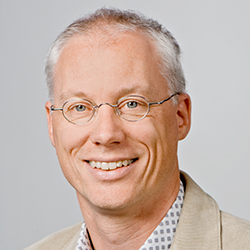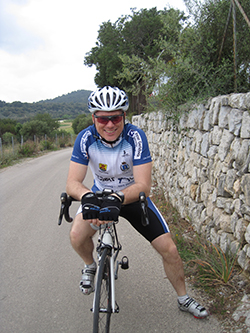Meet Bernhard Küster
Bernhard Küster at Technische Universität München in Munich, Germany, is a new associate editor of ͵��͵�� and Cellular Proteomics. Küster’s research involves studying interactions between drug molecules and protein populations in cells. He also is a co-founder of a biotechnology firm called . ASBMB Today’s science-writing intern Alexandra Pantos interviewed Küster to learn more about his research and career trajectory, his position as associate editor, and his work and life philosophies. The interview has been edited for length and clarity.
 Bernhard Küster
Bernhard Küster
at Technische Universität München in Munich, Germany, is a new associate editor of ͵��͵�� and Cellular Proteomics. Küster’s research involves studying interactions between drug molecules and protein populations in cells. He also is a co-founder of a biotechnology firm called . ASBMB Today’s science-writing intern Alexandra Pantos interviewed Küster to learn more about his research and career trajectory, his position as associate editor, and his work and life philosophies. The interview has been edited for length and clarity.
What is your research group studying?
We analyze proteomes, with a special emphasis on how drug molecules interact with proteins, signaling pathways and entire proteomes. People have realized the idea that one drug only affects one protein is fairly naive. There are ample examples of secondary uses of drugs that work by a different mechanism. We would like to understand this more systematically, so that, ideally, we measure the interaction of small molecular drugs with entire proteomes. We use mass-spectrometry technologies for that because mass spectrometers are the de facto standard for detection and quantification in proteomics. The reason we are so interested in these drug-protein interactions is that we would like to find new uses for existing drugs and be able to explain potential undesired side effects – and also provide a mechanistic understanding of how these molecules work.
Could you describe your academic background and research training?
I’m a chemist by training. I studied chemistry in Cologne, Germany. Then I did a Ph.D. in biochemistry at the University of Oxford in the UK and postdoc’d at the European ͵��͵�� Biology Laboratory in Heidelberg and at the University of Southern Denmark. That is when I got into proteomics.
Was there any one thing that made you choose science?
After finishing school, it was clear that I was going to study life sciences, but at the time in Germany there weren’t so many biochemistry university courses. I ended up studying chemistry and then specializing in biochemistry later. My Ph.D. was in glycobiology, and to be quite frank, I ran away from it because it was so difficult.
But at that time, when I had to make up my mind what would happen to me, I read about early work by Matthias Mann and John Yates and the like on proteomic measurements. I asked Matthias Mann if he was interested in taking me on as a postdoc. After my postdoc, I spent seven years in the biotech industry. That was from 2000 – 2007, and that was the early days of big hype in Europe about biotech companies. I got caught by that too and joined a proteomics company called CellZome in Heidelberg, which turned out to be very successful. (Author’s note: CellZome is now part of GlaxoSmithKline.) Those seven years provided me with quite invaluable experience not only in doing science but also in managing science. I became responsible both for the mass spectrometry and also for the bioinformatics department in that company. After seven years, I had to choose to stay and keep doing what I was doing, take an offer from big pharma, or go back to university and become an academic with some industry background. And I chose the latter, because it was the best fit for what I wanted to do.
 Küster and his road bike.PHOTO COURTESY OF BERNHARD KÜSTER
Küster and his road bike.PHOTO COURTESY OF BERNHARD KÜSTER
What does the MCP position mean to you on a personal level?
It’s a very honorable thing to do. I felt flattered these guys thought I was worthy of that position. And of course the second reaction was, “Oh God, this is more work!” No, it’s certainly a great honor to be asked to serve on the board of MCP. Any academic community works by the principle that we all do something for each other, and the better we do that, the better the whole system functions, so it is my turn to give something back.
How would you say your new role is going so far?
So far, I think it’s going quite well. I read more papers than I did before, but I also get to see more comments from colleagues who have an opinion about someone’s work. As a reviewer, you can just write down your frank opinion. As an associate editor, you have to weigh the arguments.
Do you have any hobbies outside of the lab?
I am a keen road biker. Otherwise my family with three kids tends to keep me busy.
Do you have any advice for balancing life in the lab with life outside of the lab?
That’s a difficult one, because I like working, so I tend to spend a lot of time at work. The truth of the matter is that everyone needs to find their own balance. Some people seem to be able to carry on and on, and it doesn’t bother them much. Others need to watch themselves a little more, because they may not have that natural ability to keep going. But clearly, it’s important to have something outside of work just kind of to restart your brain every now and then.
Do you have any words of wisdom for scientists in training?
I think it quite useful as a scientist to try to get rid of one pet hypothesis a day. That keeps your brain alert, or at least you don’t get stuck in a certain way of thinking.
Enjoy reading ASBMB Today?
Become a member to receive the print edition four times a year and the digital edition weekly.
Learn moreGet the latest from ASBMB Today
Enter your email address, and we’ll send you a weekly email with recent articles, interviews and more.
Latest in People
People highlights or most popular articles

Transforming learning through innovation and collaboration
Neena Grover will receive the William C. Rose Award for Exemplary Contributions to Education at the 2025 ASBMB Annual Meeting, April 12–15 in Chicago.

Guiding grocery carts to shape healthy habits
Robert “Nate” Helsley will receive the Walter A. Shaw Young Investigator in Lipid Research Award at the 2025 ASBMB Annual Meeting, April 12–15 in Chicago.

Leading the charge for gender equity
Nicole Woitowich will receive the ASBMB Emerging Leadership Award at the 2025 ASBMB Annual meeting, April 12–15 in Chicago.

Honors for de la Fuente, Mittag and De La Cruz
César de la Fuente receives the American Society of Microbiology’s Award for Early Career Basic Research. Tanja Mittag and Enrique M. De La Cruz are named fellows by the Biophysical Society.

In memoriam: Horst Schulz
He was a professor emeritus at City College of New York and at the CUNY Graduate Center in Manhattan whose work concentrated on increasing our understanding of mitochondrial fatty acid metabolism and an ASBMB member since 1971.

Computational and biophysical approaches to disordered proteins
Rohit Pappu will receive the 2025 DeLano Award for Computational Biosciences at the ASBMB Annual Meeting, April 12-15 in Chicago.

